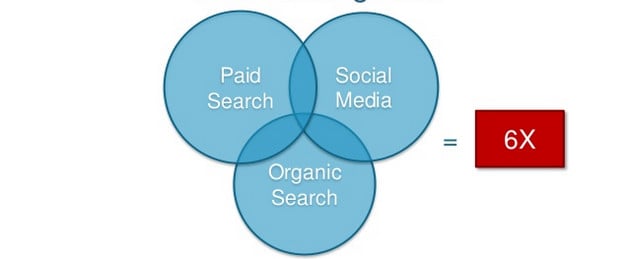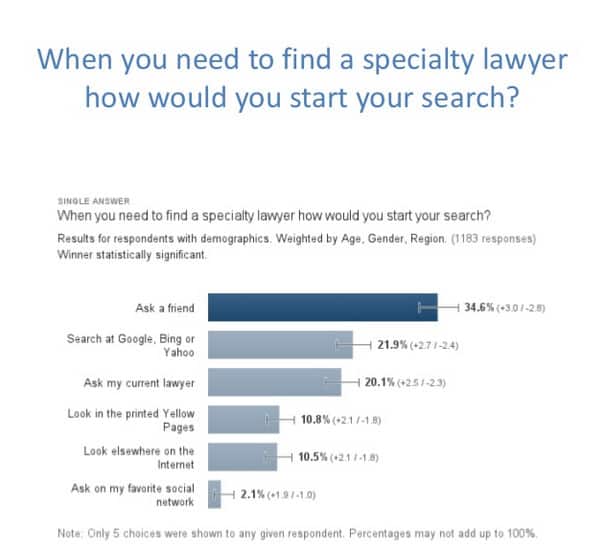
(image credit: Rand Fishkin Why SEO That Used to Work, Fails)
- John Jantsch (as cited by Steve Olenski at Forbes)
Most lawyers know that referrals are among the best sources of new business. On the other hand, most don’t recognize the interplay between referrals, social media and search.
Borrowing from around the web, integrated legal marketing involves delivering consistent, seamless and multi-dimensional experiences to potential clients.
It means marshaling the evidence of your good reputation across various channels – television, radio, print, web, search, social, email and face-to-face – in a consistent style that reinforces and complements your professional reputation.
Let's look at divorce situation focusing on paid search, organic search and social media.
A married couple has been going through a tough patch. At some point, one spouse finds some evidence of infidelity on Facebook. She’s thinking she’s had enough and starts contemplating what divorce might look like.
If she's like most people, she's like to begin discussing her situation with people she knows, likes and trusts. At some point, these discussions will likely involve legal questions and finding a lawyer.

Those discussions will take place in a variety of ways. Of course, they're likely to involve face-to-face discussions. But they'll also take place on the phone, via text messages and even on social networks.
From those conversations, questions will likely arise. If our spouse is like most people, she'll turn to the internet to do research and seek answers. More specifically, she'll turn to a search engine, most likely, Google.
She'll likely perform many refinements to her searches and pour over several organic search listings.
Some of those listings are likely to lead to posts, articles and pages published by attorneys.
If she finds what she's looking for, she may be motivated to contact one of the attorneys. Or she may download something from their site or subscribe to receive divorce information via email. She may also just leave and perform more searches.
If those attorneys were implementing paid search remarketing campaigns, our spouse would be likely to see ads from those attorneys around the web.
Before making a decision about any particular attorney, she'll probably spend a great deal of time during further research about her prospective attorney. She'll also likely go back to the people she knows, likes and trusts for referrals and validation.
The attorneys who have developed online connections with the people she knows, likes and trusts will have a leg-up in her consideration set and give them a strong competitive advantage.
First, you have to have detailed answers to questions about your target audience. In other words:
One of the most common mistake lawyers make is developing a marketing strategy for themselves. Most lawyers are not good examples of their target clients.
Second, you to understand what is troubling them. Many people who may eventually become your clients might not yet know that they even need a lawyer like you. Don't presume that your best clients are the ones that are merely searching for:
[city] + [practice area] + [attorney]
This is what everyone else is doing.
Third, you have to understand which channels these people are actually using and which are the best for you to reach them.
Once you know your audience, what they're looking for and where they're looking for it, the next step is being there and delivering that to them.
Hopefully, it's obvious to you that all of this hinges on providing excellent experiences to people. Clearly, this starts with client service. But it really goes beyond just clients. It requires providing positive experiences to just about anyone who might form an opinion about you and refer you business.
Your reputation in the real world is the cornerstone of your ability to earn new clients.
But it's not the shingles. In other words, it's essential, but not necessarily sufficient.
Lawyers that invest time in forging, nurturing and solidifying relationships, are the ones that are winning. And these relationships are evolving both offline and online.

Over the years, law firm prospects have sent us reports from just about all of our competitors. Unfortunately, even today, some law firm marketing agencies still mislead their clients via "reporting." One particularly egregious example comes in the form of ranking reports. Which prompted this LinkedIn post. To my surprise, I received a lot of […]
John Wanamaker supposedly said "Half the money I spend on advertising is wasted; the trouble is I don't know which half." In an an effort to figure out "what half is working," attribution was born. Coupled with a transition from traditional, offline ads to digital media, attribution became the holy grail for analyzing advertising spends. But […]
I recently asked ChatGPT, "What are some of the top personal injury law firms in Chicago?? Actually, first I ask "who are some of the top personal injury lawyers in Chicago?" ChatGPT couldn't handle that one, so I modified the prompt. ChatGPT listed five very well-known firms downtown. Can you guess the other four? That's […]
If you're like me, you have some degree of AI, ChatGBT, Bard, exhaustion. Now don't get me wrong, this is stuff is remarkable and is changing, well, a lot. But before you hook up the ChatGPT API to your WordPress API and crank out 10,000 pages, here are a few things to think about. Let's […]
If you know me, you know my opinions about links and SEO advice from Google. If you don't, here's the TL;DR: Meh, links! Meaning, all things being equal, links still remain a competitive difference maker for ranking. Take Google's SEO advice with several grains of salt. Google has no economic incentive to help your site […]
The best marketing advice I can give you is to be authentic. Of course, you don't find that very helpful in terms of meeting your growth goals. So, you might decide to game the system. As I'm writing this, one of the more popular ways to gain the system is to pay for engagement. This […]
The following post was written by ChatGPT. ChatGPT, developed by OpenAI, is a state-of-the-art language model that can generate human-like text based on a given prompt or context. This technology has the potential to revolutionize the way that businesses, including law firms, market themselves to potential clients. One way that a law firm could use […]
How long does SEO take? When can I expect to see results? What results should I expect to see? These are all reasonable questions that we field from lawyers every day. And, like many legal answers, the answer is: It depends. Yes, I know that's not the answer you wanted. But it's the most honest […]
And how much time should they spend doing it? I recently had the privilege of chatting with Tyson, Jim, and Conrad for an upcoming episode of The Maximum Lawyer Podcast. If you're not familiar with The Maximum Lawyer community, you should definitely check it out. Jim asked a really great question about who should do […]